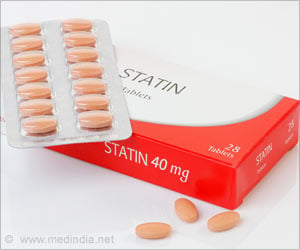Insights into Safety and Efficacy of Statins in Elderly patients could significantly improve clinical outcomes
- Regular usage of statins provides significant reductions in major cardiovascular events, including stroke, by approximately 19%.
- Statin therapy is safe in the elderly and has no effect on nonvascular mortality, cancer death, or cancer incidence.
- Cost has not limited the use of statins in the elderly.
Read More..
Efficacy and Need for Statins
Older patients are at increased risk of developing atherosclerosis or clots within blood vessels (1✔ ✔Trusted SourceTreatment with Statins in Elderly Patients
Go to source). The incidence of atherosclerosis raises with age and the number of cardiovascular events is more in patients aged above 60 years. Atherosclerosis occurs due to increased levels of lipids or cholesterol.
What are Statins?
Statins are medications that lowers cholesterol levels in the blood. They help to prevent cardiovascular events like stroke, heart attack, angina. The most efficient and cost-effective therapeutic option to prevent or reduce the incidence of atherosclerosis is the treatment with statins.Statins act by decreasing the levels of all lipids or cholesterol in our blood. Advantages or efficacy is clearly visible after at least one year of treatment.
-
In the PROSPER trial, it was found that the risk of developing cardiovascular disease, cardiovascular death, stroke was decreased by 15% (2✔ ✔Trusted Source
Pravastatin in elderly individuals at risk of vascular disease (PROSPER): a randomised controlled trial
Go to source). The level of LDL-cholesterol was reduced in 34% of the patients who received pravastatin. - In the study named Heart Protection Study (HPS) (3✔ ✔Trusted Source
MRC/BHF Heart Protection Study of cholesterol lowering with simvastatin in 20,536 high-risk individuals: a randomised placebo-controlled trial
Go to source), simvastatin was compared with placebo. It was found that there is a reduction of 18% in coronary death and 25% regarding coronary events. - In one meta-analysis, it was observed that statins provided 24% proportional reduction in major coronary events for every 1·0 mmol/L reduction in LDL cholesterol and with increasing age, there is smaller proportional reduction in cardiac events (4✔ ✔Trusted Source
Efficacy and safety of statin therapy in older people: a meta-analysis of individual participant data from 28 randomised controlled trials
Go to source).
Global Burden of Cardiovascular Disorders
As per the World Health Organization (WHO), ischemic heart disease is the reason for 16% of deaths globally. Totally, 8.9 million people died of ischemic heart disease in 2019 (5✔ ✔Trusted SourceThe top 10 causes of death
Go to source).
One of the major risk factors for these diseases is dyslipidaemia or hyperlipidaemia (excess levels of lipids or cholesterol in the blood), and the prevalence of dyslipidaemia is very high globally.
Commonly Used Statins
- Atorvastatin
- Rosuvastatin
- Fluvastatin
- Simvastatin
- Pravastatin
- Pitavastatin, etc.
Safety of Statins
Common side effects include headache, dizziness, muscle pain, sleep disturbances, digestive issues, feeling tired or weak (6✔ ✔Trusted SourceOverview
Go to source). Uncommon side effects include muscle damage, liver damage, increased risk of type 2 diabetes, sexual problems, memory problems, hair loss, acne etc.
Uncommon side effects usually develop after prolonged treatment with high dose statins. Side effects are much more common in elderly patients, due to their multiple associated comorbidities, hepatic and renal functional decline, and drugs that may interact with statins. However, the benefits overweigh the disadvantages of the treatment with statins and so the treatment with statins should be encouraged.
- In the HPS study, it was identified that the risk of myopathy was around 0.1% for simvastatin.
- In the study of the Effectiveness of Additional Reductions in Cholesterol and Homocysteine 12,064 patients were included. Results showed that the risk of myopathy was 0.9% high dose of simvastatin compared to 0.02% with low dose simvastatin (7✔ ✔Trusted Source
Study of the effectiveness of additional reductions in cholesterol and homocysteine (SEARCH): characteristics of a randomized trial among 12064 myocardial infarction survivors
Go to source).
- Treatment with Statins in Elderly Patients - (https://pubmed.ncbi.nlm.nih.gov/31671689/)
- Pravastatin in elderly individuals at risk of vascular disease (PROSPER): a randomised controlled trial - (https://pubmed.ncbi.nlm.nih.gov/12457784/)
- MRC/BHF Heart Protection Study of cholesterol lowering with simvastatin in 20,536 high-risk individuals: a randomised placebo-controlled trial - (https://pubmed.ncbi.nlm.nih.gov/12114036/)
- Efficacy and safety of statin therapy in older people: a meta-analysis of individual participant data from 28 randomised controlled trials - (https://www.thelancet.com/journals/lancet/article/PIIS01406736(18)31942-1/fulltext)
- The top 10 causes of death - (https://www.who.int/news-room/fact-sheets/detail/the-top-10-causes-of-death#:~:text=The%20top%20global%20causes%20of,birth%20asphyxia%20and%20birth%20trauma%2C)
- Overview - (https://www.nhs.uk/conditions/statins/)
- Study of the effectiveness of additional reductions in cholesterol and homocysteine (SEARCH): characteristics of a randomized trial among 12064 myocardial infarction survivors - (https://pubmed.ncbi.nlm.nih.gov/17967584/)
Source-Medindia













